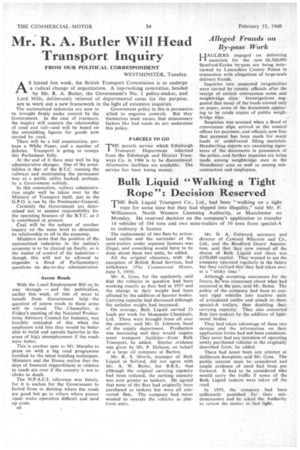Bulk Liquid "Walking a Tight
Page 42

If you've noticed an error in this article please click here to report it so we can fix it.
Rope": Decision Reserved
THE Bulk Liquid Transport Co., Ltd., had been "walking on a tight rope for some time but they had slipped into illegality," said Mr. F. Williamson, North Western Licensing Authority, at Manchester on Monday. He reserved decision on the company's application to transfer 14 vehicles of 104 tons and two semi-trailers of 10 tons from special-A to ordinary A licence, The replacement of two flats by articulated outfits and the surrender of the semi-trailers under separate licences was illegal, and something would have to be done about these two units, he added.
All the original objectors, with the exception of British Road Services, had withdrawn (The Commercial Motor, June 5, 1959).
Mr. A. Goss, for the applicants, said that the vehicles in 'question had been -working exactly as they had in 1957 and the change in their weight had been affected by the addition of heavier bodies. Carrying capacity had decreased although the unladen weight had increased.
On average, Bulk Liquid carried 23 loads per week for Monsanto Chemicals, Ltd. These were brought from all over the country, said Mr. D. Johnson, head of the supply department. Production was increasing and they would require more transport facilities—from Bulk Transport, he added. Similar evidence was given by Mr. P. Dobson, on behalf of a large oil company at Barton.
Mr. K. S. Morris, manager of Bulk Liquid at Salford, did not agree with Mr. A. W. Balne, for B.R.S., that although the original carrying capacity had been reduced, the earning capacity was now greater as tankers. He agreed that none of the fleet had originally been purchased as tankers but were all converted flats. The company had never wanted to operate the vehicles as platform units.
Mr. N. A. Fulwood, secretary and director of Cawood Wharton and Co., Ltd., and the Bradford Dyers' Association, said that they now owned all the shares of Bulk Liquid and there was £250,000 capital. They wanted to see the company operated regularly in the future but they realized that they had taken over at a "sticky time," Althougli accepting assurances for the future, he was concerned about what had occurred in the past, said Mr. Balne. The policy of the company had been to convert rigid vehicles into tractive units of articulated outfits and attach to them special-A trailers, thus doubling their carrying capacity. They also converted flats into tankers by the addition of lightmetal bodies.
They had taken advantage of these two devices and the information on their application forms had not been consistent They never had any intention of operating newly purchased vehicles in the originally described form, he added.
There had never been any attempt at deliberate deception, said Mr. Goss. The public interest must be considered and ample evidence of need had been put forward. It had to be considered who would carry the traffic if some of the Bulk Liquid tankers were taken off the road.
In 1959, the company had been sufficiently punished for their misdemeanours and he asked the Authority to review the matter in that light.




















































































































